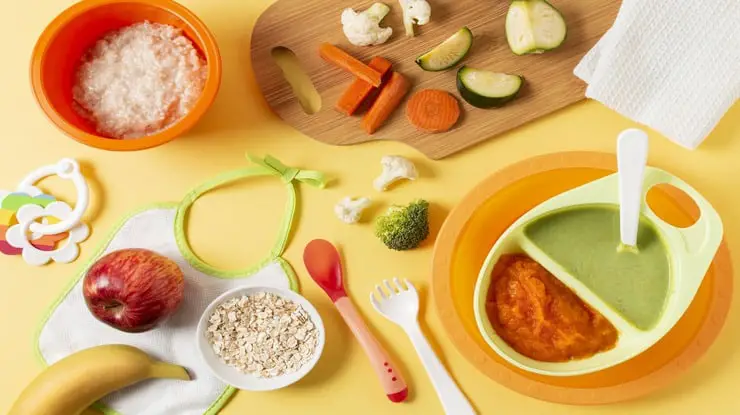Nutrition Tips for Toddlers: Nurturing Healthy Eating Habits from an Early Age
We know, parents, that you’re tirelessly reaching for the moon and the stars for your little one’s well-being. And guess what? Nutrition is the supercharged rocket fuel they need for their incredible health journey. Let’s sprinkle fun and nutrition onto every meal from day one to fill their little tummies with every nutrition they need.
In this article, we’ll dive into simple yet effective tips to help your toddler embrace healthy eating habits. Together, we can make this exciting adventure a wonderful blend of love and essential nutrients, transforming each meal into a delightful, healthful experience!
Importance of healthy eating habits for toddlers
Providing a well-balanced diet to the toddler is crucial as it sets the foundation for lifelong eating habits. Good nutrition supports physical growth, enhances cognitive development, strengthens the immune system, and promotes overall well-being. By instilling healthy eating habits in your toddler, you are equipping them with the tools they need for a healthy future.
As we navigate this journey, let’s also remember that your kid’s taste buds are a playground of discovery. Introducing colorful fruits, veggies, and whole grains in your kids’ feeding bowls and plates can set the stage for their lifetime love affair with healthy food.
4 Best Nutrition Tips for Your Toddlers
Tip 1: Make Habits for Healthy Eating
1. Breastfeeding and formula feeding for infants:
Breast milk is the ideal source of nutrition for infants. It provides essential nutrients and antibodies that boost their immune system. However, if breastfeeding is not possible within time, you can store and reheat breast milk for later.
Infant formula is another suitable alternative healthcare professionals recommend. Breastfeeding or formula feeding during the first year of life sets the stage for healthy eating habits in the future.
2. Give solid foods and transition to table foods:
Around six months of age, your baby will be ready to explore solid foods. Start with single-ingredient purees such as mashed fruits and vegetables in various textures and flavors. As your child grows, you can transition to mashed or finely chopped table foods, allowing them to self-feed and explore different tastes and textures.
Tip 2: Create a Balanced Toddler Diet
1. Provide all food groups:
A balanced toddler diet should include a variety of foods from each food group. Offer a combination of fruits, vegetables, whole grains, lean proteins, and dairy products. Each food group provides essential nutrients necessary for your child’s growth and development. Sometimes you need to be creative with meal ideas to ensure a diverse and nutritious diet.
2. Portion sizes and meal frequency:
Remember, toddlers have small stomachs, so providing appropriately sized portions is important. Offer daily small, frequent meals and snacks to meet their energy needs. Besides, you must pay attention to your child’s hunger and fullness cues to avoid overfeeding or underfeeding. Remember, their appetites may vary from day to day, so trust their internal cues.
3. Offer healthy snack options:
Snacks are an excellent option to incorporate additional nutrients into your toddler’s diet. Select nutritious options like sliced fruits, yogurt, whole grain crackers, or homemade energy balls. However, don’t forget to limit sugary snacks and processed foods, as they offer little nutritional value. Encourage water as the primary beverage and limit sugary drinks.
Tip 3: Encourage Healthy Eating Habits
1. Be a positive role model:
Children often adopt their parents’ behaviors. So make sure to set a positive example when it comes to healthy eating. Enjoy meals together as a family, and let your child see you making nutritious choices. Avoid labeling foods as “good” or “bad” for your kids. Instead, you should focus on nourishing their bodies.
2. Involve toddlers in meal preparation:
Engage your child in meal planning and preparation to create a sense of ownership and excitement about food among them. You should also take them to the grocery and let them choose fruits and vegetables. In addition, involve them in age-appropriate tasks like stirring, pouring, or arranging ingredients. These small involvements help them develop a positive relationship with food.
3. Make your mealtimes enjoyable:
Create a pleasant and relaxed environment during mealtimes. Minimize distractions like television or electronic devices and encourage conversation. Besides, you can offer a variety of colors, textures, and flavors on their plate to make eating more engaging. Also, allow your child to explore and experiment with food at their own pace.
Tip 4: Deal with Picky Eaters
1. Offer a variety of foods:
Toddlers can be naturally selective regarding foods. Hence, you should offer various flavors and textures that can help expand their palate. Also, keep introducing new foods alongside familiar ones. Offer vegetables in different forms and pair them with favorite foods to make them more appealing.
2. Be patient and persistent:
It’s common for toddlers to show resistance or hesitation toward new foods. Stay patient and persistent; it can take several attempts before they accept a new taste. Encourage your child to take at least one bite of unfamiliar food, and avoid pressuring or bribing them to eat. Remember, a positive and relaxed atmosphere is key.
3. Sneaking in nutrients:
If your child consistently refuses certain food groups, find creative ways to incorporate those nutrients into their meals. For example, you can blend vegetables into sauces, sneak finely grated vegetables into muffins or pancakes, or create smoothies with hidden greens. Be mindful of potential allergies and consult with a pediatrician if necessary.
Conclusion
Instilling healthy eating habits in your toddler is a gift that will benefit them throughout their lives. Building a good foundation for a healthy diet sets the stage for their long-term well-being. It not only improves your child’s health but also makes their future well-being.
Parenting toddlers is challenging but not so hard. You can secure your child’s future health by creating a healthy eating habit among them.
FAQs
How can I make my toddler to eat more vegetables?
– Offer a variety of vegetables prepared in different ways and include them in meals your child already enjoys. Make vegetables fun by cutting them into appealing shapes or pairing them with your favorite dips. Be patient and offer vegetables regularly; it may take multiple exposures before they develop a taste.
Is it normal for toddlers to be picky eaters?
– Yes, it is normal for toddlers to exhibit picky eating behaviors. Toddlers are exploring their independence and asserting their preferences. They may go through phases of food refusal or develop strong aversions to certain tastes or textures. You should be patient and continue offering a variety of foods. Most picky eating tendencies improve over time.
Can I give my toddler vitamins or supplements?
– Generally, a well-balanced diet provides all the necessary nutrients. However, in some cases, a pediatrician may recommend specific vitamins or supplements, especially if there are dietary restrictions or deficiencies. However, you should consult a doctor before giving your toddler any supplements to ensure safety.




